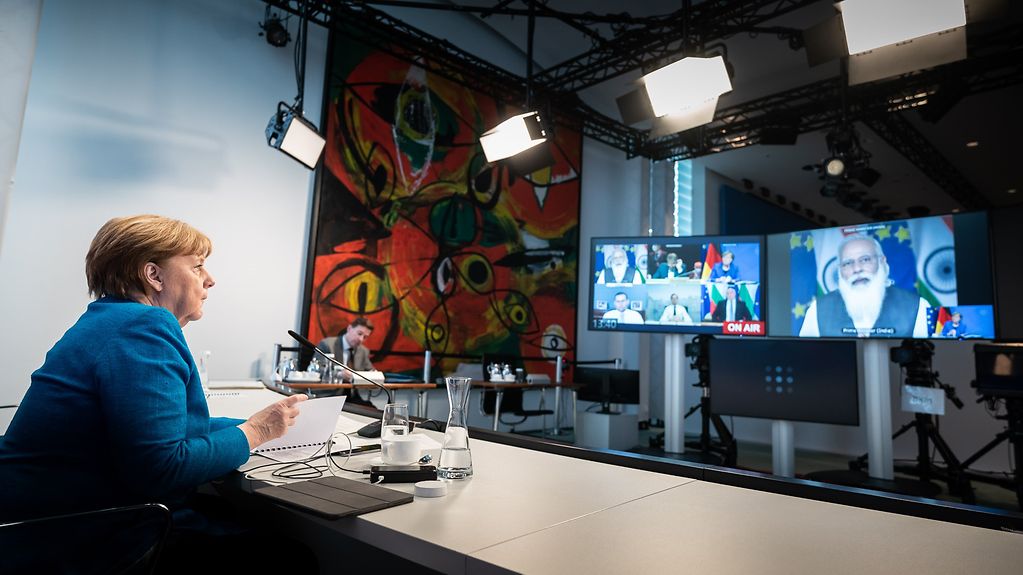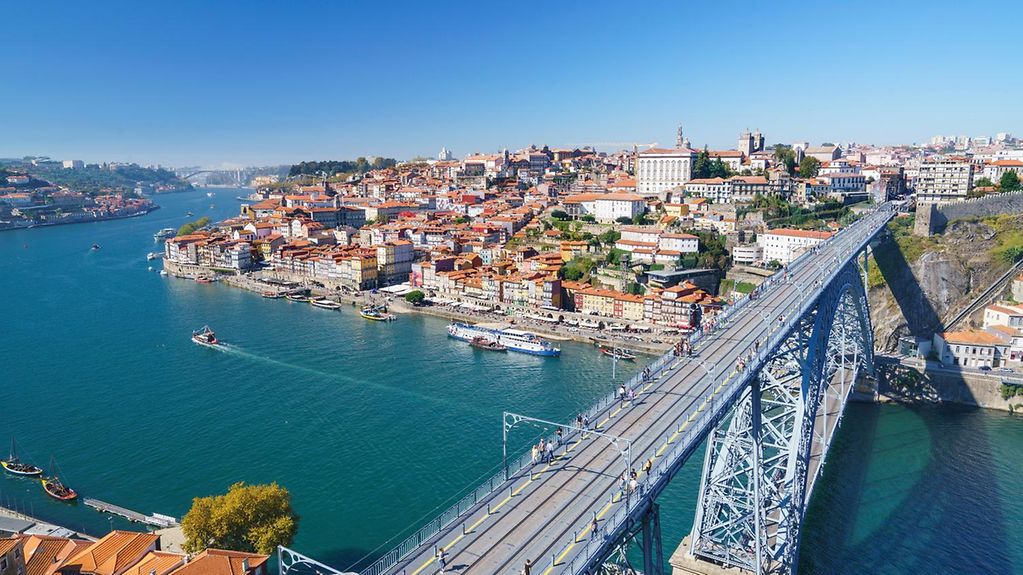European Union meeting in Porto
On Friday and Saturday, Chancellor Angela Merkel took part online in an informal meeting of the European Council in Porto. The focus was on combatting the pandemic and on European social policy. An EU-India summit looked at stepping up relations with the world’s largest democracy.
5 min reading time

The Indian Prime Minister Narendra Modi joined the EU-India summit via a video link, while Chancellor Angela Merkel took part from the Federal Chancellery in Berlin.
Photo: Bundesregierung/Kugler
Portugal’s Presidency of the Council of the European Union hosted a two-day summit in Porto this weekend. It was broken down into three parts: a social summit, an informal meeting of the European Council and an EU-India summit. Some participants met in Porto, while others, including Chancellor Angela Merkel, joined by video link.
Portugal has adopted harsh measures over the last few months, which have allowed it to push down its COVID-19 incidence. Nevertheless, Chancellor Angela Merkel asked Prime Minister António Costa if she could attend the summit meeting by video link. She took this decision in view of the situation in Germany and the strict restrictions everyone in Germany is currently having to live with.
Strengthening the social dimension in Europe
The meeting revolved around European social policy, which is a priority of Portugal’s Presidency of the EU Council. Before all 27 leaders met for initial talks on Friday evening, a top-level conference was held in the afternoon focusing on the implementation of the European Pillar of Social Rights.
The EU heads of state or government attended, or were represented by their ministers of labour and social affairs. The Federal Republic of Germany was represented by Hubertus Heil, Federal Minister of Labour and Social Affairs. The heads of the EU institutions also attended, along with representatives of the social partners and civil society. The European social partners adopted the Porto Social Commitment on strengthening the commitment to implementing the European Pillar of Social Rights.
The starting point for talks was the European Commission’s European Pillar of Social Rights Action Plan proclaimed in 2017 at the Gothenburg Social Summit for Fair Jobs and Growth in Sweden. The Action Plan sets out three main objectives that are to be achieved by 2030:
1. An employment rate of at least 78 per cent of 20-64 year olds in the European Union
2. Annual professional development for a minimum of 60 per cent of adults
3. Reduction of the number of people living in poverty or social exclusion by at least 15 million, including 5 million children.
Heads of state and government adopt the Porto Declaration
At the following informal meeting of the European Council on Saturday, the heads of state and government also explored the social dimension of the EU, and agreed on the Porto Declaration. Chancellor Angela Merkel welcomed the Commission’s Action Plan. The discussion of European social policy was taking place at the right time, she said, because in all member states “young people in particular are facing many difficulties”. Jobs are also at risk. This makes the European Pillar of Social Rights “exceptionally important”.
European social policy – why is it important?
The consequences of the pandemic, climate change and digital transformation are huge challenges for the EU. The social dimension plays an important role. Commitment to EU unity and solidarity also means guaranteeing equality of opportunity for all, and ensuring that nobody is left behind.

Porto, a coastal city in north-west Portugal, hosted the meeting of the European Council.
Photo: mauritius images / Diversion / Ebiko Wataru
Discussion of the pandemic
Alongside social policy, efforts to combat the pandemic figured prominently on the agenda of the heads of state and government. Chancellor Angela Merkel warmly welcomed the fact that the European Commission has entered into another major contract with BioNTech/Pfizer, which takes additional and future vaccinations into account. The contract also includes vaccine modifications in case of virus mutations. “We will, of course, need this medium- and long-term production of vaccines and the support of innovation and of science and research,” declared Chancellor Angela Merkel.
Council discusses vaccine patents
Angela Merkel reported that the Council had held a very balanced discussion of vaccines. She said, she had made it quite clear that she does not believe that patent waivers are the solutions to providing more people with vaccines. What is more important, stressed Angela Merkel, is “the creativity and innovative force of companies” and added that part of that, in her view, is the protection provided by patents. There are absolutely no indications that manufacturers are not working “to raise production capacities, award licenses and cooperate”. The path taken by BioNTech from start-up to major producer demonstrates “the speed with which a great deal has been achieved”.
It is important, said Angela Merkel, “to manufacture genuinely high quality vaccines”. If patents are waived without it being possible to “check the quality rigorously every time, I see more risks than opportunities”. “We will do everything to increase vaccine production and give all parts of the world access to the plants that manufacture the vaccine,” declared Angela Merkel. Calling patents into question, however, “is not the way that will lead us to more and better vaccines”.
Stepping up cooperation with India
Chancellor Angela Merkel joined the meeting in Porto by video link on Friday evening to prepare the EU-India summit with the other leaders. The summit took place on Saturday, with all European Council members. The Indian Prime Minister Narendra Modi joined by video link.
Cooperation on vaccine production
The pandemic was a focus of talks in view of the dramatic rise in the incidence in India. All EU states, said Angela Merkel, “have provided assistance for India in an attempt to mitigate the country’s suffering at present”. Prime Minister Narendra Modi expressed his thanks for this.
At the summit, the EU and India discussed cooperation on vaccine production. The Chancellor stressed that she can visualise even closer cooperation. Production will be needed for years to come “before the virus is really defeated”.
Climate action and free trade
With a view to climate action, the EU and India are together preparing for the UN Climate Change Conference that is to be held in Glasgow in November. India has “launched a huge number of gigantic initiatives to expand the use of renewables, especially solar power,” said Angela Merkel. In the field of trade, the summit has “brought new impetus to the free trade agraeement”, she underlined. “Work on the agreement can now continue apace.”
Why are the EU’s relations with India important?
India is one of the world’s largest and fastest growing economies. Before the pandemic, the country’s gross domestic product (GDP) was growing at a rate of about six per cent a year. The EU is India’s largest trading partner, while India is the EU’s ninth largest trading partner. More in-depth cooperation is to bring people in the EU and in India specific advantages – on the basis of shared principles and values such as democracy, liberty, the rule of law and human rights.